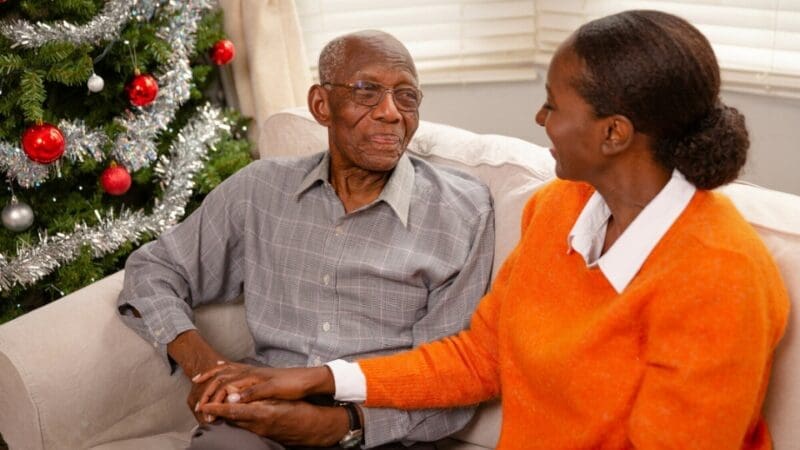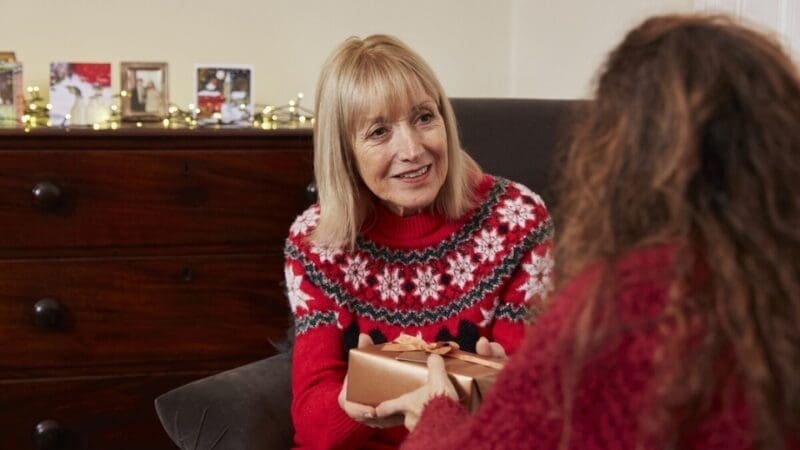
Admiral Nurse Dementia Helpline
Call or email our Dementia Helpline/Alzheimer's Helpline for reassuring and practical advice from our specialist team of Admiral Nurses.
Common questions that our Admiral Nurses hear on our Helpline with answers
We share answers to some common questions that our dementia specialist Admiral Nurses hear on Dementia UK’s Helpline over Christmas and the New Year – and that might help you over the weeks ahead.
Christmas is a time when families come together, so it’s natural to want your mum to be with you. However, familiarity, structure and routine are important for people living with dementia, and big gatherings, noise and changes in routine can be unsettling, disorientating and overstimulating.
You know your mum best, so if you think leaving the care home might be overwhelming for her, consider bringing Christmas to her – either by yourself or with a small group of family and friends – for a more intimate celebration. Enjoying favourite songs or films from past Christmases together, or bringing in old photos and keepsakes, can be a wonderful way to reminisce and share meaningful stories.
It’s a good idea to speak to the care home staff as they may be organising their own Christmas festivities and activities – this might relieve any lingering feelings of guilt about your mum missing out on your celebrations.
It’s great that you’re thinking about your wife’s comfort during the Christmas period. Before your daughter visits, you could talk to her about how her mum is doing and let her know what to expect. Discuss some of the ways you usually navigate her symptoms and how to communicate with her.
It can be upsetting to see the changes in a loved one with dementia if you haven’t been together for a while, especially for children, who may not understand what is happening. It’s important to have an open conversation with them, using age-appropriate language and allowing them time to process their emotions and ask questions. You might like to look at our list of books to help children understand dementia.
While children can bring great joy at Christmas, the additional noise and busyness could be unsettling for a person with dementia. Consider planning some calm, dementia-inclusive family activities like arts and crafts, listening to music, a cosy movie night, baking, or a gentle walk. Ensure there’s a quiet space for your wife to retreat to if she feels tired or overwhelmed, like a spare bedroom.
Maintain familiarity and structure for your wife, including mealtimes, drinks, medications and bedtime routines, and pay attention to signs of distress if the situation becomes overstimulating.
Don’t’ forget to take care of yourself, too – make sure you ask for help and take breaks when needed.
Christmas and New Year can be especially difficult when you have lost someone, and this year may look and feel different from years gone by. People find comfort in different ways: you may want to distract yourself and keep busy; or have a quieter year and sit with your emotions, thinking of your loved one. There is no right or wrong way to grieve or to spend the holiday, but please do not hesitate to seek support if you need it.
Cruse Bereavement Care has some strategies that might help with your grief this Christmas.
It’s common for families to notice changes in their loved ones when they spend longer periods together. It’s important not to rush into worrying about what might be happening and create anxiety. However, if you can, have a calm and considered conversation with your mum and see if she has noticed any changes. You may want to discuss your observations or concerns; she might have her own worries but not be sure what to do.
Your dad might be in denial about the possibility of dementia or might be overcompensating for the changes in your mum, perhaps without realising. Good communication is vital, so if possible, allow your parents to guide the conversation and ask their thoughts on next steps.
Alcohol can prevent some medications from working effectively and may make dementia symptoms worse (for example by increasing confusion, drowsiness and the risk of falling). However, it is important to allow people to have a choice and support their quality of life.
We recommend checking in with your GP or pharmacist about whether your husband can have a drink – with some medications, it’s safe to have a small amount of alcohol. You could also consider alcohol-free or low alcohol versions of your husband’s favourite drink.
Eating and drinking can be a challenge for people with dementia: they may have trouble swallowing, not recognise the signs of hunger, forget to eat or decline food. But it does not necessarily mean that they can’t join in with family meals.
Often, meals can be adapted or made more accessible. For example, you may be able to mash or puree your dad’s food or cut it into bite-sized pieces. If he has been referred to a Speech and Language Team for swallowing advice, they can offer guidance tailored to his needs.
People living with dementia often experience changes in taste or food preferences, alongside other changes relating to food and drink intake. These tips may help them eat and drink well over Christmas:
Try not to overload the plate: offer small amounts of different foods initially
Leave small bowls of food or snacks such as crisps or fruit in accessible places (but take care if the person has swallowing difficulties)
Use bright coloured crockery with a rim, or use a favourite or familiar plate and cup
Be flexible – they may prefer something else to a traditional Christmas meal and that’s okay
If you need support with any aspect of dementia over the festive period, we are here for you. Please call our free Helpline on 0800 888 6678 (Monday-Friday 9am-9pm; Saturday, Sunday and bank holidays 9am-5pm; every day except 25th December), email helpline@dementiauk.org, or book a phone or video appointment.

Call or email our Dementia Helpline/Alzheimer's Helpline for reassuring and practical advice from our specialist team of Admiral Nurses.

Our Admiral Nurses have put together a list of 12 Christmas tips so that you can enjoy the festivities whilst caring for someone with dementia.

Our dementia specialist Admiral Nurses have put together suggestions for appropriate Christmas gifts for people with dementia